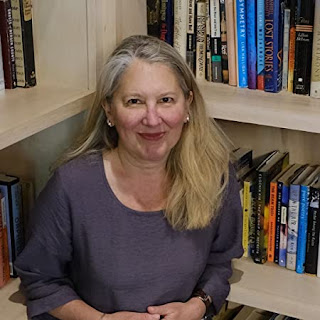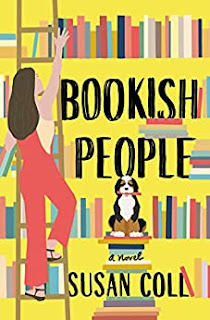Susan Coll is the author of the new novel Bookish People. Her other books include the novel The Stager, and her work has appeared in a variety of publications, including The Washington Post and Washingtonian. She is president of the PEN/Faulkner Foundation.
Q: You've worked at Politics & Prose bookstore in Washington, D.C.--how much did your experiences there inspire Bookish People, and how did you create your characters Sophie Bernstein and Clemi?
A: I am, much to my own surprise, back at Politics & Prose part-time, helping with the transition back to in-person events, and it’s great to be back, although also a little meta. Even though the book is fiction, and the unnamed bookstore in the novel is not meant to be P&P, there are undeniable resemblances and I sometimes feel like I’m in the middle of a scene.
Each of those characters---Sophie and Clemi---is arguably a little bit of me. I was (and still am!) older than most of my colleagues, which enabled me to observe the occasional disconnect that Mrs. Bernstein, who owns the store, sometimes feels around her much younger employees.
At the same time, my job is much more like Clemi’s job – she’s the bookstore events manager, and it was fun to write from her point of view.
Q: The Kirkus Review of the novel says, in part, “As much fun as Coll has with vacuum cleaners—a truly surprising amount—it’s literary humor where she slays.” What do you think of that description, and how did you come up with the ideas for the books your fictional store sells?
A: Thank you Kirkus! That is one of my all-time favorite reviews. I love that line about slaying so much that I want to put it on a t-shirt.
I did have a lot of fun with the vacuum cleaner---the book was inspired in part by the real-life troublesome vacuum cleaner at P&P, which has apparently now been replaced.
The End of Day Reports sprinkled throughout the novel are based on real documents that the store manager sends out each day, and when I worked there they contained so many vacuum cleaner status updates---the hose was clogged, the belt was broken, it was back in the shop---that at some point this seemed ripe for comedy.
Re the books: some are fictional, some are real. The real books slipped in easily. Others I needed to make up.
Raymond Chaucer, the poet on a bender, and his work are fictional. The title, Kaboom!, sounded both funny and explosive, which it is given that it sparks protests. The same is the case with The Girl in Gauzy Blue, a confection of a debut novel. It has the ring of everything trendy and trending.
Q: How would you describe the dynamic between Sophie and Clemi?
A: I think Sophie is protective of Clemi in a maternal sort of way, but it’s complicated. Sophie is not her best self during the week that the story unfolds. She can be domineering and judgmental, and she knows it. There is love between them, but it is strained by circumstances as well as the employer/employee relationship.
Q: What do you think the novel says about the world of independent bookstores?
A: The book is a love letter to independent bookstores and to booksellers, especially. They build community in countless different ways. (Support your local indie!)
Bookstores are good fodder for a comic novel in that you find a lot of highly intelligent people working very hard in what is not the most well compensated industry, and it can at times become a pressure cooker. It is analogous to academia, which of course has spawned a genre of comic novels.
Q: What are you working on now?
A: My next novel is inspired by the Silver Bridge collapse in Point Pleasant, West Virginia, in 1967, and the legend of the Mothman. I’ve been thinking about this subject for about 10 years, and even once went, by myself, to the Mothman Festival. I’m still struggling to find the story that I want to tell, but it’s slowly coming into focus.
--Interview with Deborah Kalb. Here's a previous Q&A with Susan Coll.


No comments:
Post a Comment